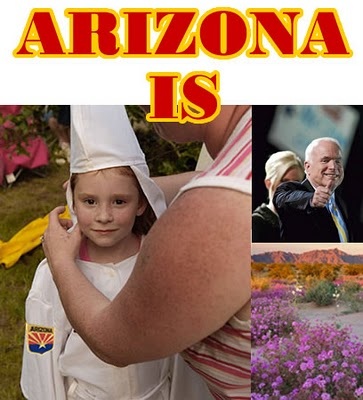Racism as Policy: Court Rules Arizona Sheriff Targeted Latinos based on Skin Color
/ From [HERE] amd [HERE] Maricopa County Sheriff Joe Arpaio, a racist suspect, relied on racial profiling and illegal detentions to target Latinos, a federal district court said today. The ruling comes following a three-week trial in July and August over a pattern of unlawful practices by Arpaio and the Maricopa County Sheriff's Office on immigration sweeps and traffic stops.
From [HERE] amd [HERE] Maricopa County Sheriff Joe Arpaio, a racist suspect, relied on racial profiling and illegal detentions to target Latinos, a federal district court said today. The ruling comes following a three-week trial in July and August over a pattern of unlawful practices by Arpaio and the Maricopa County Sheriff's Office on immigration sweeps and traffic stops.
"This is a victory for everyone," said Cecillia Wang, director of the ACLU Immigrants' Rights Project. "Singling people out for traffic stops and detentions because they are Latino is unconstitutional and just plain un-American. Let this be a warning to any agency trying to enforce the 'show me your papers' provision of SB 1070 and similar laws — there is no exception in the Constitution for immigration enforcement."
 Section 2(B) gives police too much discretion when stopping or detaining persons while “checking” their citizenship status. Sec. 2(B) cannot be implemented without racially profiling non-whites in violation of the Fourth Amendment’s prohibition on unreasonable searches and seizures and the Fourteenth Amendment’s Equal Protection Clause.
Section 2(B) gives police too much discretion when stopping or detaining persons while “checking” their citizenship status. Sec. 2(B) cannot be implemented without racially profiling non-whites in violation of the Fourth Amendment’s prohibition on unreasonable searches and seizures and the Fourteenth Amendment’s Equal Protection Clause.
 (That is, police stops and detentions of persons based on physical characteristics or persons who look Latino (brown skinned persons or darker skinned persons who appear to be African, Cuban, Dominican, Hatian or West Indian immigrants to the police are "reasonable" under the Arizona law = any stop and detention of a non-white person). Even lawful detentions and arrests become unconstitutional when the detention becomes prolonged or unreasonable. If officers rely on profiling characteristics such as a person’s ethnicity in determining whether a person should be detained for an immigration check, Sec. 2(B) becomes an unconstitutional “stop-and-identify” law repugnant to all citizens. [HERE] and NACDL amicus curiae brief.
(That is, police stops and detentions of persons based on physical characteristics or persons who look Latino (brown skinned persons or darker skinned persons who appear to be African, Cuban, Dominican, Hatian or West Indian immigrants to the police are "reasonable" under the Arizona law = any stop and detention of a non-white person). Even lawful detentions and arrests become unconstitutional when the detention becomes prolonged or unreasonable. If officers rely on profiling characteristics such as a person’s ethnicity in determining whether a person should be detained for an immigration check, Sec. 2(B) becomes an unconstitutional “stop-and-identify” law repugnant to all citizens. [HERE] and NACDL amicus curiae brief.

'Whats a smiling face when the whole state is racist?' In photo Arizona Governor Jan Brewer, a racist suspect. The court held: "...[T]he MCSO has no authority to detain people based only on reasonable suspicion, or probable cause, without more, that such persons are in this country without authorization... [I]n the absence of additional facts that would provide reasonable suspicion that a person committed a federal criminal offense either in entering or staying in this country, it is not a violation of federal criminal law to be in this country without authorization in and of itself. Thus, the MCSO's...policy that requires a deputy...to detain persons she or he believes only to be in the country without authorization...[constitutes an] unreasonable seizure under the Fourth Amendment to the Constitution."
The American Civil Liberties Union, the ACLU of Arizona, the Mexican American Legal Defense and Educational Fund (MALDEF), and the law firm Covington & Burling LLP represented a class of Latino residents and a Latino community organization, Somos America.
On Sept. 25, a federal appeals court confirmed that Arpaio's office cannot detain people solely on the suspicion that they are undocumented by refusing to reverse a lower court's ruling. Today, U.S. District Judge G. Murray Snow issued a decision in Melendres v. Arpaio that found the policies and practices of Arpaio and his office are discriminatory, violate the Fourth and Fourteenth Amendments and Title VI of the Civil Rights Act of 1964.
"Today's decision vindicates the rights of Latinos in Maricopa County who've been terrorized by discriminatory MCSO practices and have had their communities torn apart," said Dan Pochoda, legal director of the ACLU of Arizona. "The court recognized that racial profiling within the Maricopa County Sheriff's Office is a pervasive and widespread problem that can only be addressed through substantive, meaningful changes to eradicate this egregious practice and begin rebuilding public trust."
"I applaud the many individuals who came forward to tell their stories with courage and dignity. This decision brings us one step closer to justice," said Lydia Guzman of Somos America. "I look forward to working together to ensure that the MCSO is not allowed to profile our community any longer."
"The evidence fully supports the finding of an equal protection clause violation," said Stanley Young, a partner with Covington & Burling. "We proved a discriminatory intent, through the sheriff's own internal correspondence and public statements, as well as admissions that the MCSO uses Hispanic ethnicity as a reason to pursue immigration inquiries. We also proved a harmful effect, in the form of higher stop rates and longer stop times for Hispanics. Even apart from racial discrimination, we also proved that the MCSO improperly detains motorists and passengers without having an adequate basis. All of these violations will now need to stop."
"The voices of Sheriff Arpaio's racial profiling victims have been heard," said Nancy Ramirez, western regional counsel, MALDEF. "Today's decision vindicates Maricopa County community members who have long suffered from the sheriff's discriminatory and illegal practices. We look forward to seeing much needed reforms implemented at the MCSO."
MCSO's rampant racial profiling had created a culture of fear in Maricopa County. Latinos and others who look or sound "foreign" have worried that a trip to the grocery store or to work will end with interrogation by armed officers or incarceration at the county jail. Today's decision is a major step in ending that culture of fear. With this victory, plaintiffs' attorneys will make a detailed submission to the district court by outlining steps that should be taken to put an end to the MCSO's illegal practices.
For a copy of the decision:
aclu.org/racial-justice/ortega-melendres-et-al-v-arpaio-et-al-decision
More information on the case is available at:
aclu.org/immigrants-rights-racial-justice/ortega-melendres-et-al-v-arpaio-et-al





































































































































































































































































